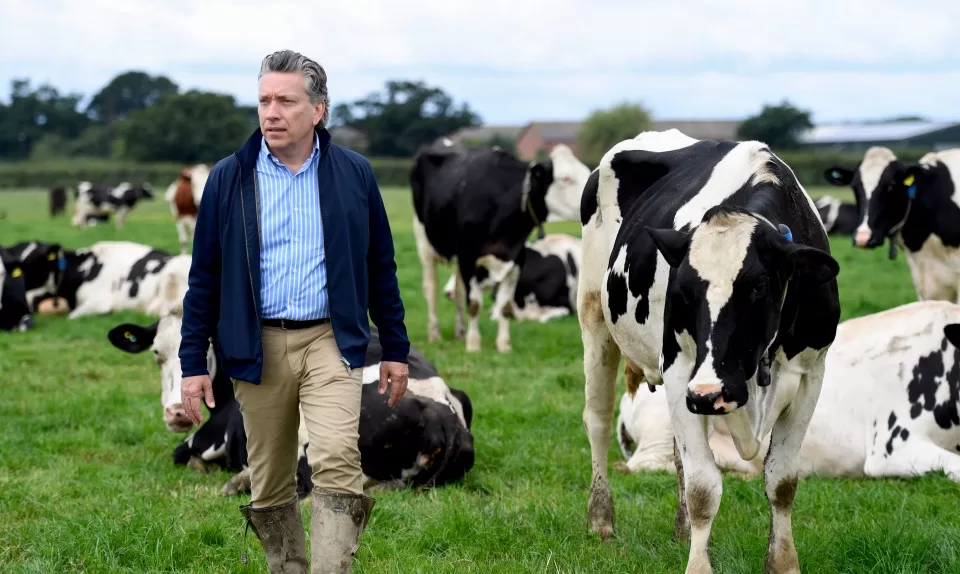THE boss of dairy giant Arla says putting solar panels on cattle sheds will help offset greenhouse gases from farting cows.
Bas Padberg said members of the farming co-operative were keen to play their part in making milk production more eco-friendly.
And he has written to the head of the Labour Government’s new “Mission Control” of energy experts — which was launched last month — to ask for help.
Mr Padberg said the number and size of farm sheds in the dairy industry made them well-suited to having solar panels.
But currently just 30 per cent are being used to generate solar power.
Arla says if solar rooftops were rolled out across its 2,000 farms, right, they would generate electricity to power 51,800 homes.
Mr Padberg reckoned: “It means Arla farmers could provide enough extra power for a town the size of Gloucester or Cheltenham or Rochdale.”
He said the biggest problem farmers faced was being linked to the electricity grid and said many grid connections came only “after a long delay and at inordinate cost”.
Arla’s farms are responsible for around a quarter of milk production.
The dairy industry is a contributor of greenhouse gas emissions, largely because of the methane produced from cows.
It is estimated the production of milk contributes around 2.8 per cent of greenhouse gas emissions.
Some retailers are investing in methane-reducing cattle feed to make cows’ parps and burps more environmentally friendly.
The Government has vowed to make grid connection a priority and launched Great British Energy to boost greener power.
Ministers plan to publish a “solar roadmap” shortly to detail how they will work with industry.
Mission Control is a dedicated team of energy experts appointed to spearhead the UK’s drive towards clean power by 2030.
Announced last month, the group will look to accelerate the transition from fossil fuels.
Led by Chris Stark, former chief exec of the Climate Change Committee, it will work with energy companies and regulator Ofgem.
The Government say it will help to create jobs as well as helping the environment.
A Department for Energy Security and Net Zero spokesman said: “Solar power is at the heart of our mission to make Britain a clean energy superpower and more energy-independent.
“Solar panels on industrial buildings such as farm sheds will play a key role, alongside a rooftop revolution on new homes to ensure they are fit for a net zero future.”
We get a move on
THE Bank of England’s decision to cut rates for the first time in four years has created a surge of interest from housebuyers and sellers, according to Rightmove.
The number of hopeful buyers contacting estate agents rose by 19 per cent this month.
The number of sellers listing their property was up 5 per cent in the same period.
Rightmove now expects property sale prices to rise by 1 per cent this year.
Chicken on wing & share
CHICKEN chain Wingstop opened a 50th site in the UK yesterday as buyers circle the fast-growing business.
Wingstop, which launched in Britain six years ago, plans to open a further six restaurants this year and 20 next year.
The expansion will add 300 jobs to a workforce of 2,500.
The US fast food chain plans 200 sites within five years.
Chris Sheriff, boss of parent company Lemon Pepper Holdings, said the 50th branch in Bolton was a “milestone”.
The business has hired bankers at Goldman Sachs to find new owners.
A private equity buyer is the most likely option.
Fried chicken shops rule the roost, with Brits spending £4.58billion on chicken in fast food restaurants in the past year, according to Kantar.
Wingstop is already going head-to-head with recent US arrivals Popeyes and Dave’s Hot Chicken, who also have aggressive expansion plans.
Business boom
ABOUT 68,000 new British businesses were set up in the first half of the year, 6.6 per cent more than the same time last year.
Figures from a start-up index by Beauhurst, supported by Natwest, suggest it may be a record year for the sector.
Spend power up
THE cost-of-living crisis is starting to ease for some Brits, with the average household disposable income the highest since 2021.
The latest Asda Income Tracker reveals it rose by 11.7 per cent in July to £245 per week.
It is the biggest amount since before the crisis took hold.
Wallets have been helped by inflation falling to 2 per cent and wage rises being around 6 per cent, according to official figures.
But analysts say more households are building savings back up.
Shares big plus
SHARES in online trading platform Plus 500 jumped 4 per cent yesterday as it hiked its profit forecast and unveiled an £84million stock buyback.
It said its cash balances had surpassed $1billion (£771million) for the first time, as it added 56,759 customers to its platform in the last six months.
It also saw an 8 per cent rise in half-year revenues to £306million.
Since its 2013 listing, it has returned £1.77billion to investors, generating 50 times the return from its flotation price, making it the FTSE’s best-performer.
